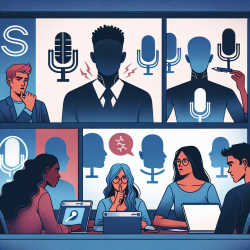As practitioners dedicated to improving the lives of children who stutter, it is crucial to base our interventions and public awareness strategies on solid research findings. A recent study titled University Students Familiarity with Famous People Who Stutter provides valuable insights that can inform our practice.
The study aimed to assess university students' ability to recognize famous individuals who stutter. A questionnaire was administered to 69 students, featuring 30 multiple-choice items where each item included one famous person who stutters (PWS) and three fluent contemporaries. The findings revealed that, as a group, the famous PWS were not correctly identified by the majority of students. Only two students performed better than chance, and only five famous PWS were consistently distinguished from their fluent peers.
This research highlights several key points that can help us refine our strategies:
- Familiarity and Recognition: The study suggests that many famous PWS are not well-recognized by the general public, including university students. This lack of recognition can hinder the effectiveness of using famous PWS in public awareness campaigns.
- Choosing Spokespersons: When selecting spokespeople for stuttering awareness, it is essential to balance their familiarity, popularity, and ability to convey the correct message. Non-famous individuals who openly demonstrate stuttering behaviors might depict the condition more realistically and educate the public more effectively.
- Public Education: There is a need for ongoing education to dispel misconceptions about stuttering. The study's findings underscore the importance of targeted efforts to increase public awareness and understanding of stuttering.
As practitioners, we can take several steps to implement these insights:
- Promote Realistic Role Models: Use individuals who openly exhibit stuttering behaviors and have realistic stories of overcoming challenges. This approach can provide relatable and inspiring examples for children who stutter.
- Educate Through Multiple Channels: Utilize various platforms, including social media, school programs, and community events, to disseminate accurate information about stuttering and the experiences of those who stutter.
- Collaborate with Support Groups: Work closely with stuttering support groups to identify effective spokespeople and develop educational materials that resonate with the public.
Encouraging further research in this area is also essential. Future studies could explore the familiarity of different demographic groups with famous PWS and investigate the impact of various public awareness strategies on changing perceptions about stuttering.
By integrating these research findings into our practice, we can enhance public awareness and support for children who stutter, ultimately leading to better outcomes.
To read the original research paper, please follow this link: University Students Familiarity with Famous People Who Stutter.










